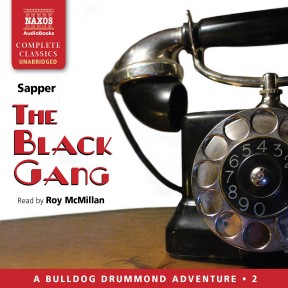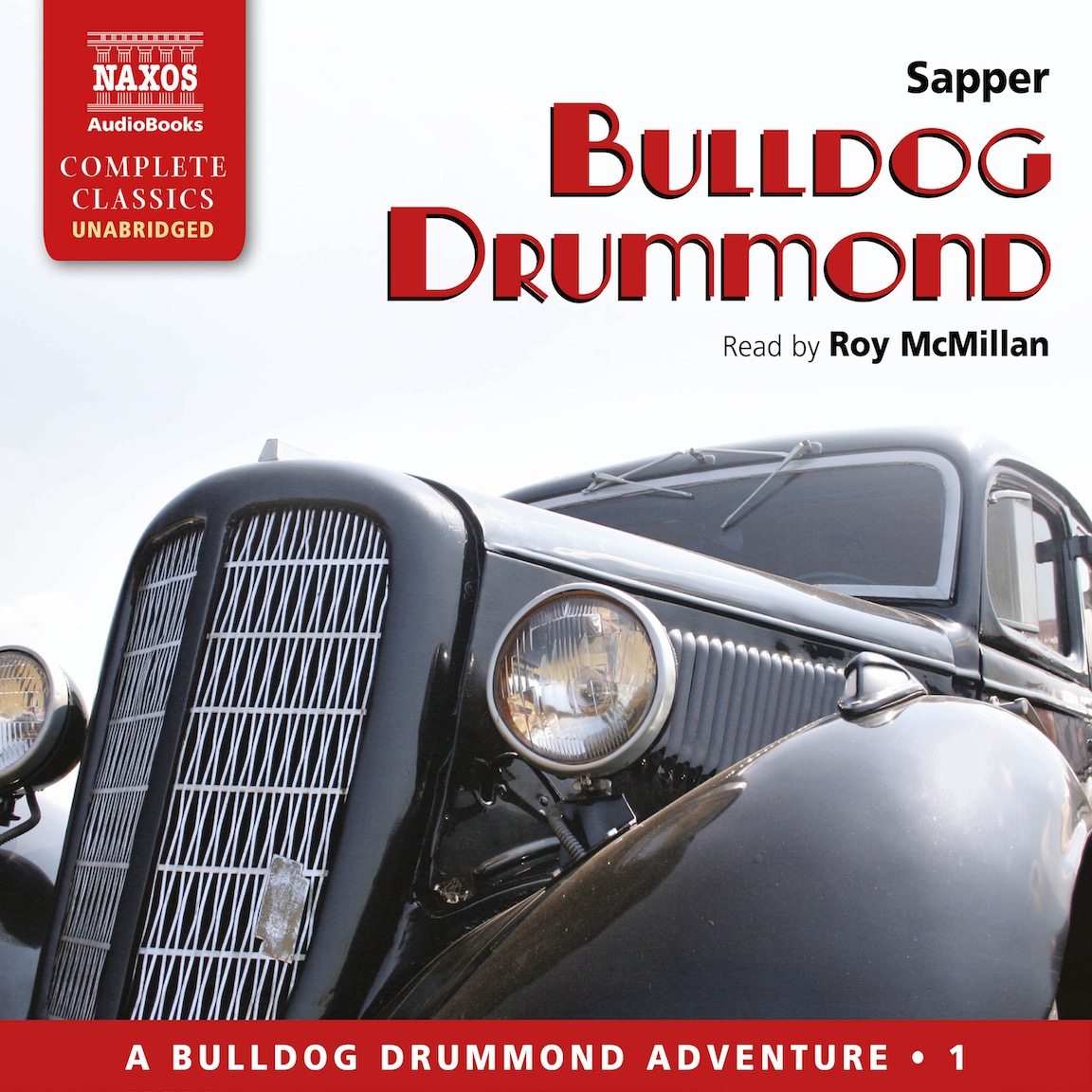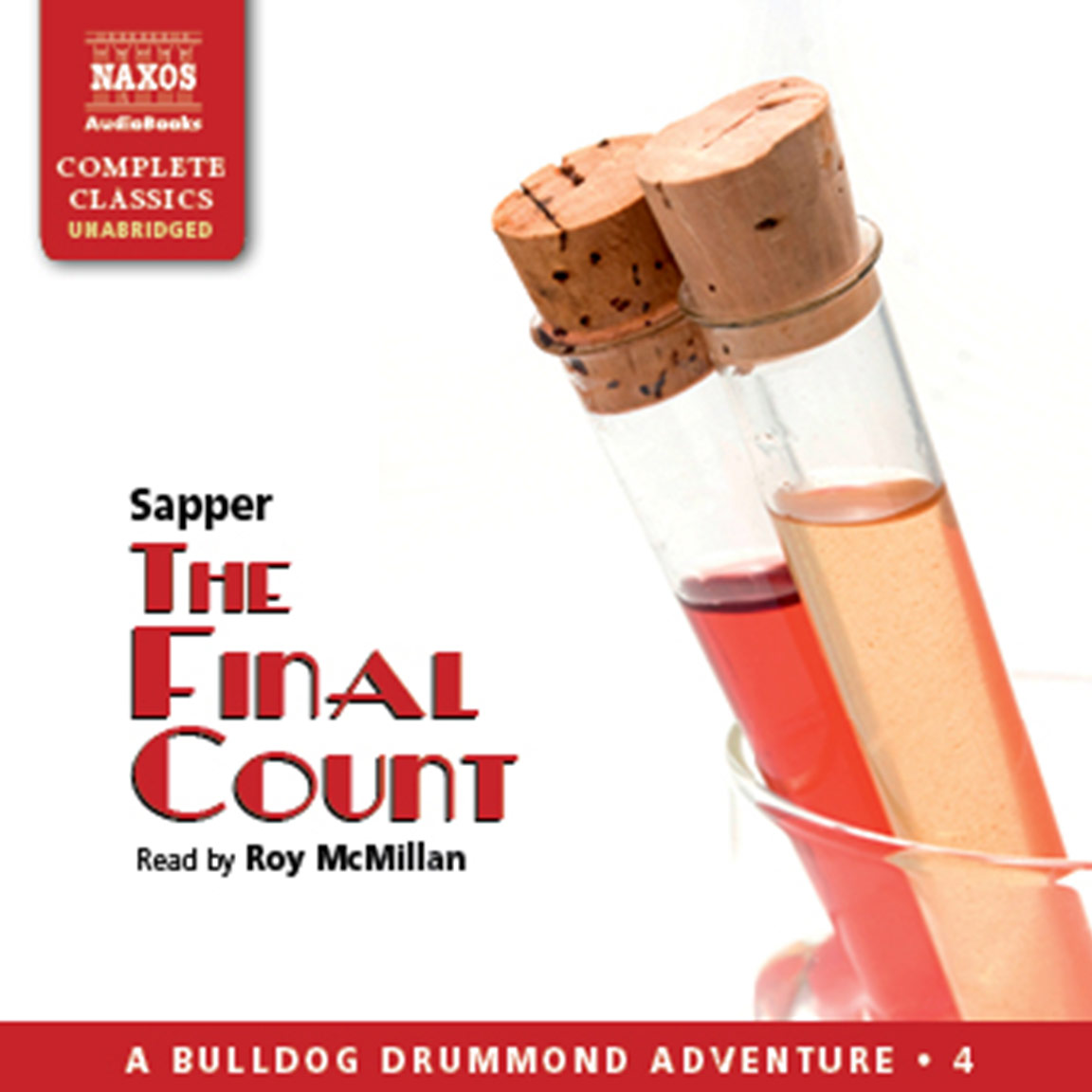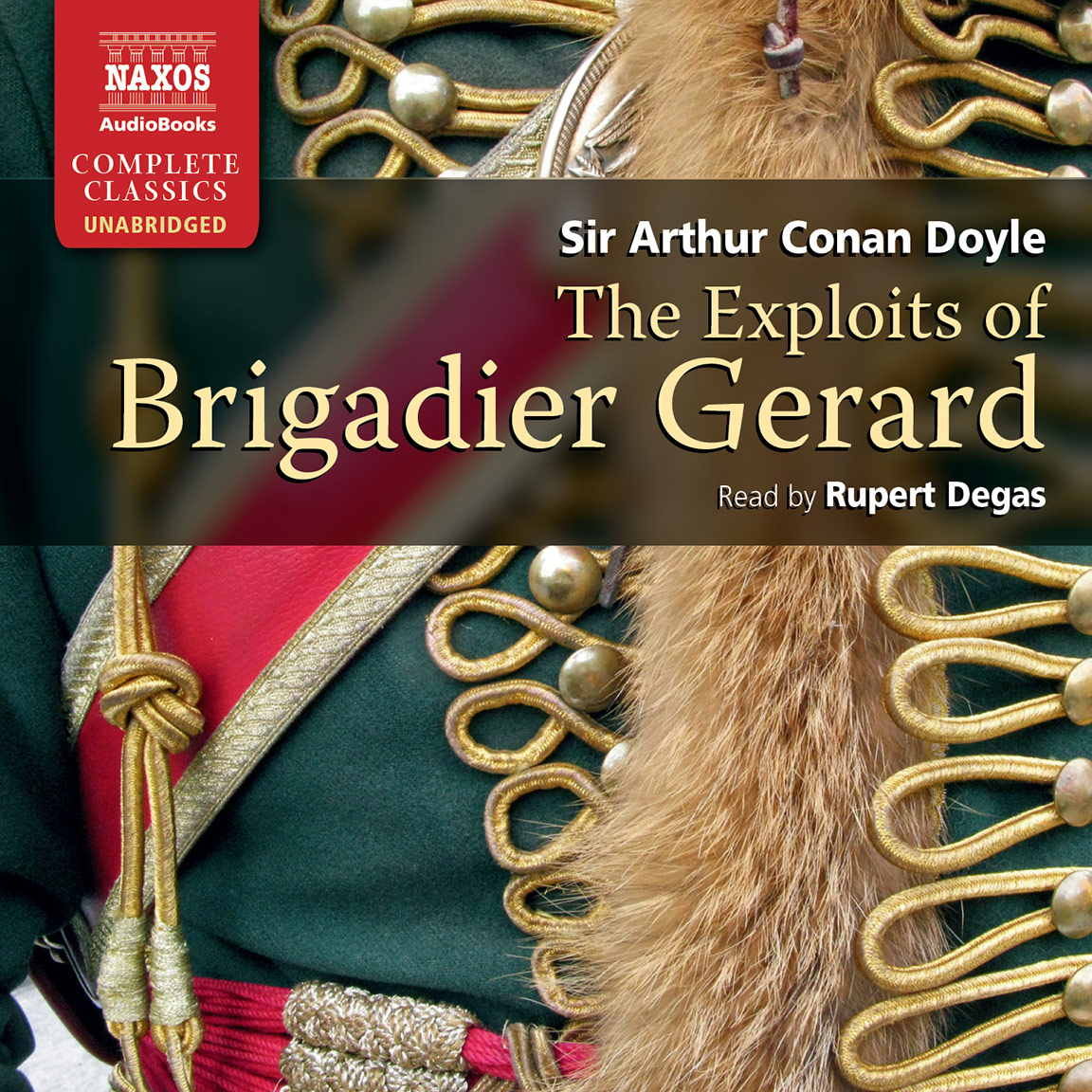
Audio Sample
Sapper
The Black Gang
Read by Roy McMillan
unabridged
Bulldog’s back! This time, there is a plot to foment a revolution in England, a plot that has left the Police baffled and the nation at the mercy of a master criminal. A disguised clergyman, a beautiful sidekick, an arcane poison, car chases and abductions all fail to see off Hugh Drummond and his gang of ex-Army friends. But when the plotters capture Drummond’s wife, the game is up… isn’t it? Undaunted, charming, brave and resourceful, Bulldog Drummond is an archetypal English adventure hero, and the forerunner of The Saint and James Bond.
-
Running Time: 7 h 48 m
More product details
Digital ISBN: 978-1-84379-392-2 Cat. no.: NA639112 Download size: 114 MB BISAC: FIC002000 Released: September 2010 -
Listen to this title at Audible.com↗Buy on CD at Downpour.com↗Listen to this title at the Naxos Spoken Word Library↗
Due to copyright, this title is not currently available in your region.
You May Also Enjoy
Reviews
The Black Gang (1922), the second book (of ten) in the Bulldog Drummond series, finds Captain Hugh Drummond, DSO, MC, married to Phyllis Benton but still bored with calm civilian life in England. Villain Carl Peterson and his female accomplice Irma have escaped to the Continent but Drummond has enlisted some ex-army buddies to round up the remaining Bolshevik thugs trying to destabilize English society. They are soon dubbed “The Black Gang” by the media because of their long black coats and black masks. After they have captured and enlisted about fifty of the baddies, Peterson comes back disguised as an American clergyman helping poor Europeans. He is accompanied by his “daughter” Janet. He is furious about the loss of six priceless diamonds. Scotland Yard begins to notice the escapades of the Black Gang. Fortunately his old school chum Sir Bryan Johnstone, the Director of Criminal Investigations and Chief Inspector McIver think Hugh is a witless ninny. It takes Hugh a long time to see through Peterson’s disguise. In the meantime Phyllis is kidnapped and held on an estate surrounded by an electrified fence and a gang of goons. Hugh must also deal with a large vicious dog and a murderous Bolshevik named Yulowski who enjoys beating people to death with a rifle butt. There is a fair amount of anti-Semitism in the story typical of the 1920’s. The author, Herman Cyril McNeile, wrote under the pen name “Sapper” because serving officers were not allowed to publish under their own names. However, so popular was the series that it appeared on film and radio. After McNeile’s untimely death in 1937, his good friend Gerard Fairlie continued to create more adventures for Drummond. The series is narrated by Roy McMillan, a director, writer, actor and abridger. He is especially adept with accents (British, Russian, German, American) as well as believable female characters. He maintains the frantic pace of the action nicely. The series is highly recommended to fans of adventure novels.
Janet Julian, soundcommentary.com
Private eye Bulldog Drummond is just slightly over 80 years old. Despite his age and controversial nature, he lives on in fond memories of many who have come across him in a variety of ways. The private detective has probably entertained and shocked readers, radio listeners, film-goers and comic book enthusiasts in equal measure. There are ten original Bulldog Drummond novels written by Sapper, a.k.a. Herman Cyril McNeile, seven written following his death by his friend Gerard Fairlie, who had served as Sapper’s model for Drummond, and a final two by Henry Reymond. All of them feature the private eye of British upper-middle-class origins in books that have the format of an unabashed thriller. Drummond is unlike Agatha Christie’s cerebral, yet entertaining characters Miss Marple and Hercule Poirot, who came into being around the same time as Sapper’s far more muscular and robust detective.
Now Naxos AudioBooks has come out with an unabridged audio book of the second Bulldog Drummond novel, The Black Gang. Published in 1922, it pits Drummond and his clubby chums against Carl Peterson, a man reminiscent of Sherlock Holmes’ nemesis, Moriarty. Bond’s creator, Ian Fleming, admitted Peterson, in turn, served as the model for the evil Blofeld with whom James Bond battled on behalf of Her Majesty’s Secret Service. Admittedly, Fleming and Conan Doyle, Holmes’ creator, wrote much more nuanced books than Sapper, but the lack of refinement does not detract in the least bit from the thriller aspects of The Black Gang.
So, who is Drummond? He is described by his creator as retired British Army Captain Hugh Drummond, DSO, MC. He is wealthy and bored after serving in the trenches of France in World War I, and seeks a way to fill his time with adventure. Working as a private eye seems to be his idea of a good way to find the excitement he craves. On his first assignment in a book called simply Bulldog Drummond, which came out in 1920, he stumbles across the evil Carl Peterson, who desires world domination. Besides, Drummond’s original ad for a job in The Times leads to his first assignment from a young woman, Phyllis Benton, who ends up becoming his wife. In 1922, upon the publication of The Black Gang, he once again gets ensnared in Peterson’s evil plans.
As for McNeile, he adopted the nom de plume ’Sapper’ because British officers were not allowed to write under their own name. As he had served in the Royal Engineers, choosing to call himself ’Sapper’ seemed natural. He began his writing career in 1915 with several short stories about his experiences in the trenches. But instead of placing the focus on war’s horror, he kept an up-beat tone that made his tales immensely popular. He served with distinction and gained the Military Cross for bravery in the first and second battles of Ypres. But he chose his friend Fairlie as the model for Drummond because he had served in the Scots Guards, had been an Army boxing champion, and served on the British bobsled team that ended up in the 1924 Olympics. He, thereby, suited the image of Drummond more than the dapper though bookish McNeile.
The Black Gang is probably the best of the four books dealing with this gang. Actor Roy McMillan is highly effective as the reader of this tale in audio book format. His vocal impersonations of the various characters, good and evil – there are no shades in between these two – are excellent. For those who recall Bulldog Drummond from radio programs, this version of The Black Gang will lead them on a sentimental, albeit violence-charged journey into the past.
The Black Gang, in addition to all of the other Bulldog Drummond stories, contains passages that will make today’s audience squirm because – and rightly so – the team that put this audio book on disc did not choose to make it politically correct. Consequently, the listener gets a novel of its time: jingoistic and prone to racial slurs. While we do not like such images today, to change the references would rob the novel of its original flavor, which includes the snobby attitudes of the 1920s British upper crust and the fears of the lower. One still shudders at the idea that now some schools have chosen to give their students a sanitized Adventures of Tom Sawyer to read in which the ’N-word’ has been expurgated. Talk about changing history. No matter how bad the past has been, to remove the truth from it denies what has been achieved for the better today.
Without giving away too much of the plot of The Black Gang, Peterson is once again attempting a coup d’état to enable a pro-communist takeover of Britain. He does so strictly for his own profit, not for political belief. The Black Gang, headed by Drummond and consisting of his clubby public school friends, even aided by Phyllis, manages to foil him once again. We also meet the clueless Sir Brian Johnstone, New Scotland Yard’s director of criminal investigation and Chief Inspector McIver, who are disturbed by the activities of the secret, black-dressed, black-hooded Black Gang. A certain popular mystique surrounds this gang, seemingly consisting of ruffians who have a tendency to beat up London’s lower class of criminals, even abducting them for re-education.
In the books that featured the Black Gang, Sapper made no attempt to give dimensions to his characters. He wrote on the surface, aiming for entertainment with a dash of melodrama, peppered by violence, and nothing more. That is why his detective attracted the movie industry and stars such as Ronald Coleman, Ralph Richardson, and Walter Pidgeon portrayed him. With such starry company from the past, Roy McMillan is in good company and listeners can be sure they will have a few evenings of good entertainment. They can also be assured that The Black Gang is no more two-dimensional than most current TV offerings. And this audio book comes without commercial interruption!.
Alidë Kohlhaas, Lancette Arts Journal
Booklet Notes
For Bulldog Drummond, ‘clubbing’ always had two meanings. On the one hand, there was the affable, cocktail-sipping, upper-middle-class chumminess between himself and his friends, full of jocular bonhomie; and on the other, there was biffing the bad guy with whatever came to hand. Both were key to the morals and mores of one of England’s more contentious literary heroes, one whose forebears include Baroness Orczy, Conan Doyle, Kipling and Buchan, and who inspired the likes of Leslie Charteris’s The Saint and Ian Fleming’s James Bond.
The Black Gang (published in 1922) is Drummond’s second outing, and it pits him once more against his magnificent adversary, Carl Peterson, the model for Fleming’s suavely evil Blofeld. He is the evil mastermind who plans global domination, of course, with a selection of vicious henchmen; there are chases and gunfights and fist-fights and last-minute escapes, naturally, with a beautiful heroine to be saved. There is also a corrupt MP, a Bolshevik uprising and – slightly less predictably – a poisoned doily. And at the centre of it all is the dauntless (indeed undauntable) Bulldog Drummond himself. Muscular if unattractive, he is a charming, big-hearted man-of-action who after service in the First World War found life dull and wanted a bit of adventure to spice things up a bit. Peterson is at the head of a monstrous plot to bring a Communist revolution to England, but it is not his Bolshevik friends who are the Black Gang. That honour goes to Drummond and his public-school colleagues, who have adopted the role of gentlemanly vigilantes and have taken the punishing of thoroughly bad types into their own hands, thereby stumbling across Peterson’s plans.
Debonair and deadly
with no need for
doubt, surrounded
by like-minded chums
and with an easily
identifiable enemy
The Bulldog Drummond stories are straightforward thrillers, unashamed adventure stories, with all the action on the surface. The villains are bad, the hero good, and the distinction is not hard to draw. There is almost no sub-text, no tortured psychology, no strutting and fretting. The attitudes and language are of their time, with no attempt to consider their implications. This is where the contention arises. Drummond, and presumably Sapper as well, clearly did not feel there was any need for temporising – the issues were clear and unquestionable. References to Jews, for example, are almost invariably associated with criminality; anyone whom the gang capture is sent to a remote island to be subjected to a physically forceful regime to correct behaviour. Most foreigners are dubious types at best, and referred to in derogatory terms. The legitimate fears and concerns of the working class are dismissed. The England (and it is England rather than Great Britain) that Drummond is desperate to preserve is the kind of class-ridden, exploitative, unjust one most don’t want at all.
And yet, and yet … it is also the world that Wodehouse described, the one in which Agatha Christie flourishes, a post-War version of that of Lord Peter Wimsey and Raffles, the Gentleman Thief. Bulldog Drummond manages to suggest the carefree attitude of these times whilst touching upon the real and deep concerns of the public at large. Communist revolution was hardly an idle threat just five years after the Revolution in Russia. And, if the idea of seeking a means to keep the thrill of wartime action alive once there is peace seems far-fetched, it was clearly true to Sapper and to his thousands of readers.
Sapper was the pseudonym of Herman Cyril McNeile, a career soldier who was born in Cornwall and served with the Royal Engineers from 1907 until the end of the First War. He served with considerable distinction, too, gaining a Military Cross for his bravery and seeing action at (among other places) the first and second battles of Ypres. He had started writing before the War and continued during it, producing stories that were enormously popular. This was because they had unquestionable authenticity while maintaining a sense of adventure rather than horrific despair. McNeile had to write under a false name, as officers were not permitted to write under their own, and he chose Sapper – the slang term for an Army engineer.
Once demobbed, his short stories continued to sell extremely well, and McNeile moved to Sussex, where he remained for the rest of his life. He married and had two sons, wrote a great many short stories for magazines (generally of the twist-in-the-tail variety), and other adventure stories and thrillers; but his reputation now rests almost entirely on Bulldog Drummond. Drummond was a huge success, and was turned into equally successful plays, radio adaptations and films, with the likes of Ralph Richardson, Ronald Coleman and Ray Milland playing him. There was just something about his dedicated yet cavalier attitude, his grim-faced determination allied to his dashing charm. Like many a boy (and man) dreams of being, he was a dead-shot, a prize-fighter and a dab-hand with a cocktail shaker. Debonair and deadly with no need for doubt, surrounded by like-minded chums and with an easily identifiable enemy, Drummond was so popular he continued to appear well after his creator’s death. His friend and collaborator, writer Gerard Fairlie, continued the stories until 1954, and two more novels by different hands appeared thereafter in the late 60s, and as recently as 2004 Drummond was reinvented for the American comic market.
Of all those who either played or adapted the character, Fairlie has by far the best claim, even without the fact that he continued writing the stories at McNeile’s request Fairlie can be said to have an even better claim to the character of Drummond than McNeile himself, for while it is always tempting to ascribe heroes to the authors’ view of themselves, Fairlie was in fact the model. During his time in the Scots Guards, he captained the Army in golf and rugby as well as being a champion boxer, went on to be a member of the British bobsleigh team at the 1924 Olympics, and may possibly have been a secret agent as well. This sporting prowess, military dedication and clarity of thought, this bravery and modesty, are absolutely the hallmarks of Drummond’s nature.
Notes by Roy McMillan



